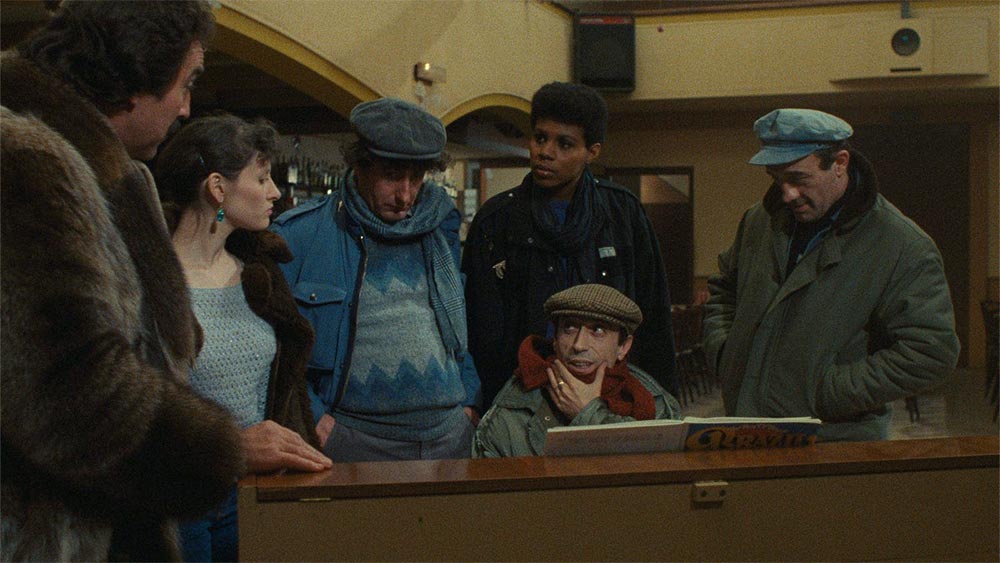The relationship between language and identity is at the heart of Jacques Rozier’s Maine-Océan Express (1986). The film starts with a scene of miscommunication in which the Brazilian traveler Dejanira (Rosa-Maria Gomes) haplessly tries to understand the French train conductor’s (Bernard Ménez) complaint about her ticket until Mimi (Lydia Field), a multilingual lawyer, steps in to miscommunicate in French once more. Rozier then spends the rest of the film assembling a mélange of different caricatures of French and international society into situations where communication constantly breaks down, but a joie de vivre keeps the film’s characters together; in many ways, it is his Stagecoach (1939). It also helps that the characters in Maine-Océan Express have a fortuitously clear schedule and an improvisational attitude toward life, so naturally Dejanira and Mimi become inseparable.
The women meet up with Mimi’s client, the sailor Petitgas (Yves Afonso), who speaks in a combination of the Poitevin dialect—noticeable even to non-Francophones—and indecipherable roars. He, a blue-collar man of the sea whose voice is acclimated to speaking above the rumble of waves and the dull thundering of barroom revelry, has been accused of minor assault after a bout of road rage. Although the large Petitgas (French for “little guy”) makes clear that no actual attack took place, he also threatens everyone in the courtroom while doing so. It’s a tactic that might’ve worked in his favor at sea or in a bar, but certainly not in court. Mimi isn’t much help either since her defense relies on academic language and abstract arguments, in which she says that blue-collar sailor-types like Petitgas speak a different language than those in professional and polite society. This stilted approach provides a very funny contrast to Petitgas’s continued disruptions, but the judge is not amused by her attempt to argue around her specific case. Mimi’s argument is silly in this context, but the humor of Maine-Océan Express rests in such misunderstandings and missed cues from characters who are from wildly different social backgrounds. The film’s beauty rests in their refusal to give up their attempts at understanding one another.
Rozier’s light touch and low stakes, as well as his love of seaside views, is present throughout Maine-Océan Express, but unlike his previous work, the camera here glides. Rozier shows off in a standout sequence that forecasts the legendary opening in Werckmeister Harmonies (2000). In it, the little group of Dejanira, Mimi, Petitgars, the train conductor, the flirtier train ticket inspector (Luis Rego), and a Mexican impresario (Pedro Armendáriz, Jr.) work together to drunkenly perform a samba dance. They mess up, reorganize the choreography, and bicker as the camera—helmed by one of the greatest living DPs, Acácio de Almeida—wanders around them, refusing to cut away so that their collaboration slowly reveals itself in real time. When they perfect their performance, the completed samba plays like a crescendo and they dance rhapsodically—it is clear everyone is speaking the same language.
Maine-Océan Express screens this evening, May 19, and on May 22, at Film at Lincoln Center as part of the series “Jacques Rozier: Chronicler of Summer.”



